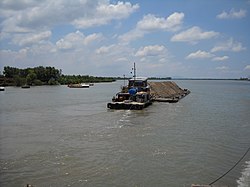| Lòng Tàu River | |
|---|---|
 Vessel moving along the Long Tau River Vessel moving along the Long Tau River | |
| Native name | Sông Lòng Tàu (Vietnamese) |
| Location | |
| Country | Vietnam |
| Basin features | |
| River system | Mekong River |
Lòng Tàu River, Vietnamese: Sông Lòng Tàu) also known as Lòng Tảo is a river in the Mekong Delta of Vietnam.
Description
Long Tau River is a distributary of the Dong Nai river that runs through Can Gio and feeds into Gành Rái Bay from its eastern branch at 10°40′10″N 106°47′24″E / 10.669542°N 106.790073°E / 10.669542; 106.790073 (title). It branches out when it reaches Nhon Trach district, with the western branch becoming the Dong Tranh river into Soai Rap while the eastern branch is a continuation of the Long Tau. Due to its complex and windy path, a system of skeletal range light towers are stationed along the river to help ship navigate. The Phuoc Khanh Bridge is currently under construction and will span the river
Overall, it runs for 75 kilometers from where it splits from the Dong Nai River and continues into Ganh Rai Bay. It has an average depth of 15 meters, running along the Cần Giờ Mangrove Forest before emptying out into the Ocean.
History
As one of the primary waterways between Ho Chi Minh City and the Pacific Ocean, the Long Tau River has played a prominent economic and military role in the region. Its strategic location has made it the host of prominent warships and military operations and many times a strategic target for both attack and defense.
It currently connects to the Cai Mep deepwater port with a second container port in the works. The main route between Ho Chi Minh City and the Cai Mep terminal for vessels and barges is separately known as Long Tau Channel. As the case with many high-traffic rivers of the Mekong Delta, the banks of Long Tau River are lined with factories.
There have been a number of shipwrecks on record, including the sinking of the Vietsun Integrity cargoship in 2019.
Aside from a transport-focus waterway, the river also has had villages along its riverbanks, though there have been ongoing plans towards the economic development of the Can Gio communities. Despite its traffic, it remains a spot for fishermen.
References
- "Quyết định 1989/QĐ-TTg Danh mục lưu vực sông liên tỉnh". THƯ VIỆN PHÁP LUẬT _ Tra cứu, Nắm bắt Pháp Luật Việt Nam (in Vietnamese). Retrieved 2021-11-11.
- "Nguồn nước và thủy văn". THÀNH PHỐ HỒ CHÍ MINH (in Vietnamese). 2011-11-07. Retrieved 2021-11-11.
- "Lighthouses of Southeast Vietnam". The Public's Library and Digital Archive. 2006-04-24. Retrieved 2021-11-11.
- "Work starts on cable-stayed bridge over Long Tau River". vietnamnews.vn. 2021-11-11. Retrieved 2021-11-11.
- "SAIGON PORT - Vietnam Seaports Association". Vietnam Seaports Association (in Vietnamese). 2021-09-30. Retrieved 2021-11-11.
- ^ Haines, E. R. (c. 1962). "Rung Sat Special Zone Intelligence Study" (PDF). Mobile Riverine Force Association. Retrieved 28 May 2013.
- "The Brown Water Navy in Vietnam". Home of Warboats.org by Combatant Craft of America. 2009-07-11. Retrieved 2021-11-11.
- Kelley, Michael P. (2002). Where We Were in Vietnam. Hellgate Press. p. 450. ISBN 978-1-55571-625-7.
- "Vietnam port faces cargo delays due to sunken ship". 4 November 2019.
- "New container port planned around Ho Chi Minh City". PAM CARGO. 2020-10-08. Retrieved 2021-11-11.
- "Changes in navigating through Vietnamese port after vessel sinks". safety4sea.com. 2019-11-04. Retrieved 2021-11-11.
- "Along the factory-dense rivers of Vietnam's Mekong Delta". Mekong Eye. July 2, 2016. Retrieved November 11, 2021.
- "Vietnam battles to get factories running again". BusinessLIVE. November 4, 2021. Retrieved November 11, 2021.
- "Sunk container ship to be raised from Long Tau River". vietnamnews.vn. 2019-11-13. Retrieved 2021-11-11.
- "Cần Giờ chuẩn bị được công nhận huyện nông thôn mới". Báo Sài Gòn Đầu Tư Tài Chính (in Vietnamese). October 26, 2020. Retrieved November 11, 2021.
- Online, Tuoi Tre (July 11, 2020). "Tàu kéo bốc cháy ở Cần Giờ, 4 người thoát chết". TUOI TRE ONLINE (in Vietnamese). Retrieved November 11, 2021.